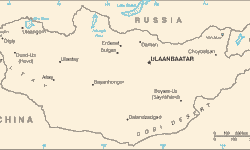The Wharton School could dust off those old E.F. Hutton commercialsto advertise when Sam Zell talks on campus, as he did on Thursday, Sept. 15. The man is that intriguing, informative and entertaining, and by the packed seats in Dhirubhai Ambani Auditorium in Huntsman Hall, it was apparent that many students wanted to hear what he had to say. So perhaps better marketing wasn’t necessary. Perhaps the organizers should have charged admission instead.
 Luckily for those in attendance, the Wharton School’s Samuel Zell and Robert Lurie Real Estate Center hosted a complimentary talk by the chairman of Equity Group Investments LLC.
Luckily for those in attendance, the Wharton School’s Samuel Zell and Robert Lurie Real Estate Center hosted a complimentary talk by the chairman of Equity Group Investments LLC.
His comments ranged across the current state of U.S. politics, the promise of global business and the growing Mongolian economy—all of it laced with passionate four-letter colloquialisms.
For starters, he said, “The world according to Sam right now is that business is not bad.”
“Generally speaking, there really isn’t much weakness in our operations,” he added. Even upon seeing the most recent numbers—August’s—for his Chicago-based, diversified private investment firm, he reported, “We’re not seeing it.”
It being the dreaded dip back into recession, which he doesn’t see happening at all in the near future … unless the Europeans do “something really insane.”
Yet Zell does not expect the U.S. economy to hit the accelerator either. About 1 percent to 2 percent growth is his GDP estimate for as long as (and here we risk getting too political by repeating his point of view, which was charged) the Obama administration is in office in its current form and temperament.
The “grave dancer,” as Zell is known, still sees room for growth around the world though. He targets locales based on existing demand, not demand that he’ll have to create.
There was the aforementioned Mongolia, where China has built two huge coal mines. With its natural riches, Mongolia will become a massive “sovereign wealth fund,” according to Zell, who braved the food and weather to witness Mongolia’s transformation himself.
For dynamic emerging economies, he pointed to Colombia. Why? Four years ago, the South American nation was producing 100,000 barrels of oil a day. Now, thanks in part to a firmer grip on its security situation, the country is producing 1 million a day.
Zell was hot on Brazil too, with its energy independence, its huge population, its effective albeit leftist government, its mineral wealth, its army of technocrats.
“What other country matches that?” he posed to the audience.
Wherever his firm goes, Zell stressed, the most important resource to find is the right partner.
“That’s the standard, and that drives us first and foremost wherever we go,” he said.

























